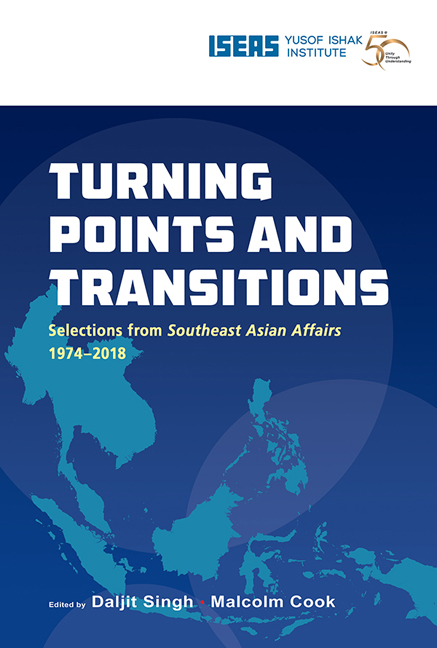Book contents
- Frontmatter
- Contents
- Message from the Director
- Foreword
- Foreword
- Introduction
- THE REGION
- BRUNEI
- CAMBODIA
- INDONESIA
- LAOS
- MALAYSIA
- The Security “Gap” in Peninsula Malaysia (1976)
- The ‘Battle Royal’ – The UMNO Elections of 1987 (1988)
- Malaysia: A Fateful September (1999)
- Tears and Fears: Tun Mahathir's Last Hurrah (2004)
- Malaysia: Political Transformation and Intrigue in an Election Year (2009)
- MYANMAR
- THE PHILIPPINES
- SINGAPORE
- THAILAND
- VIETNAM
The Security “Gap” in Peninsula Malaysia (1976)
from MALAYSIA
Published online by Cambridge University Press: 29 May 2019
- Frontmatter
- Contents
- Message from the Director
- Foreword
- Foreword
- Introduction
- THE REGION
- BRUNEI
- CAMBODIA
- INDONESIA
- LAOS
- MALAYSIA
- The Security “Gap” in Peninsula Malaysia (1976)
- The ‘Battle Royal’ – The UMNO Elections of 1987 (1988)
- Malaysia: A Fateful September (1999)
- Tears and Fears: Tun Mahathir's Last Hurrah (2004)
- Malaysia: Political Transformation and Intrigue in an Election Year (2009)
- MYANMAR
- THE PHILIPPINES
- SINGAPORE
- THAILAND
- VIETNAM
Summary
Events during the last twelve months since November 1974 have, if anything, convinced even most sceptics of the undeniable seriousness of the security situation in Peninsular Malaysia. Burgeoning, as it has, in the wake of the historic victories of the communist forces of Vietnam and Cambodia, the terrorist activities of the Communist Party of Malaya (CPM) and the rising toll of security forces personnel have indeed created a sense of concerned anticipation among outside observers. It is, of course, only too tempting to become somewhat alarmed about the developments in Malaysia in view of the disappointingly phlegmatic reaction of the other Southeast Asian states to the communist takeover of Vietnam, Cambodia and Laos and, for the prophets of doom, the equally disheartening way in which the much acclaimed domino theory appears to be fizzling out. Moreover, the grim forebodings of some Malaysiawatchers ever since the tragic days of May 1969 might understandably find a new lease of life with the revival of the undisguised racial connotations of the CPM's terrorist and propaganda campaign against the ruling Barisan Nasional (National Front) Government of Tun Abdul Razak.
New Trends in Communist Strategy
In the heat of the moment, especially after several sensational attacks such as the blowing up of the National Monument in August, the grenade-throwing incident at the Police Field Force Brigade Headquarters in Kuala Lumpur in October, and the daylight assassination of the Perak Chief Police Officer in Ipoh in November, it is easily forgotten that the authorities had, in fact, warned almost a year ago of the imminence of an escalation in communist terrorist activities following the disclosure of the three-way split within the CPM. The rationale for this anticipated course of events, as pointed out in the background paper, was that each of the rival factions would try and outdo the others in its revolutionary fervour by stepping up its terrorist tactics. The evidence, so far, certainly indicates the exceptionally virulent policy of the CPM (Marxist-Leninist) faction. Official reports of the Perak Chief Police Officer's assassination specially mentioned that pamphlets of the CPM (M-L) were found at the scene of the incident, while at least two clashes between the security forces and the communists in August in the border areas of Kroh in Kedah and Betong in Thailand were reported to have involved the CPM (M-L) elements.
- Type
- Chapter
- Information
- Turning Points and TransitionsSelections from Southeast Asian Affairs 1974-2018, pp. 401 - 410Publisher: ISEAS–Yusof Ishak InstitutePrint publication year: 2018

